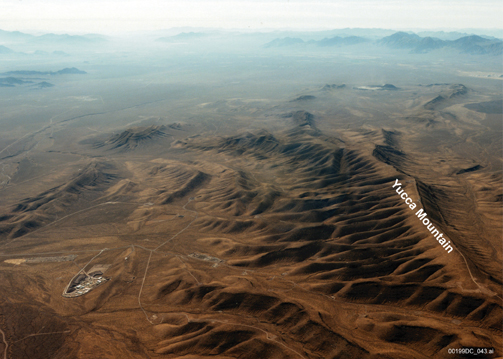The idea of a permanent nuclear waste repository is not only a bad one, it is something that humanity is fundamentally unable to build. Instead of trying to determine whether Yucca Mountain will be able to safely store nuclear waste for the next million years, we should be putting the time and money earmarked for Yucca into research into spent nuclear fuel (SNF) reprocessing technologies.
Here's my train of thought on the subject:
1. The U.S. government has spent north of $9 billion, as well as over three decades' worth of scientific reports and research, on studying Yucca Mountain and trying to determine whether it will be safe to store nuclear waste there for up to a million years in the future. Yucca was originally selected from a list of the nine most promising sites in the continental U.S., using the criteria of long-term tectonic stability, distance from major population centers, and political will. We have spent an amazing amount of time and money to learn as much as we can about Yucca Mountain, and we have found that it is probably unsuitable for the requirements we've asked of it (for example, the mountain is supposed to be dry and solid, but geologists' boreholes found it to be full of water and honeycombed with cracks). After $9 billion and 33 years of study on the best candidate for long-term storage, if this place isn't suitable for a repository, it's reasonable to ask if anywhere is.
2. Nowhere is. It is a crazy thing to think that we can build a facility that will last for a million years. The hubris of it is staggering.
We simply don't know how to build for that length of time. Most consumer goods aren't supposed to last more than five years. Buildings, levees, bridges and so forth rust, rot and decay within a hundred or so years. Even dams and seawalls will eventually break down if untended in, say, the 235 years that the U.S. has been a country.
Let me say this plainly: the idea that we can design something that will still exist and perform its original function 1,000,000 years in the future--4,255 times the lifespan to date of the nation that created it--is sheer folly. We just don't know how to compensate for a million years of erosion.
 |
| How exactly do you design for the Colorado River? |
Also, be sure not to think about the fact that existing plants have produced enough waste since they came online in the 1950s and '60s to fill up the not-yet-built repository by 2014. The politicians who came up with the idea for the repository seem to be thinking in the longest term possible, but ironically, they're not thinking about what happens a mere fifty years in the future. What happens to the waste that's produced after Yucca is full? Do we go through this whole weary mess again, research and design and wrangle over and finally build another repository, or do we simply throw up our hands, cry "Fuck this!" and launch it into the sun?
No, seriously. That's one idea that Congress considered before Yucca was authorized.
4. Fine, a permanent repository isn't the answer. So what should we do?
My answer is twofold. First, instead of one centralized repository for all the waste in the U.S., build several regional storage facilities around the country. This would minimize the distance that the waste travels (since there are very real risks in transporting waste any distance) and, by moving the waste from 104+ separate sites to, say, 10 facilities, it would make the waste that much more secure against theft or terrorism. These facilities don't have to be inside mountains, for their purpose is not to store the waste indefinitely. Rather, they would store the waste until we have the technology to recycle it and turn it into power.
Sound fanciful? We could do it today if the proper facilities were set up. Reprocessed waste can yield up to 25% of the energy of the original fuel, through recycling of unused uranium-235 and plutonium-239 in an ordinary nuclear reactor (not to mention the U-238). This greatly reduces the volume of waste, leaving behind only volatile fission by-products. Even those could potentially be reused with the adoption of a closed nuclear fuel cycle.
So if it's that easy to reprocess waste, why haven't we done it? There are three main reasons. The first is President Carter's policy decision in the 1970s to curtail reprocessing technology in the U.S., in an effort to convince the world to do the same (which did not work). Every succeeding President has followed this policy. They did this because of the second reason; P-239, produced as a by-product in nuclear plants, can be used in nuclear weapons. However, inside the U.S., the risk of this is extremely low.
Reason III is good old economics. Right now, it is much cheaper to mine natural uranium than to reuse SNF, so there has been no real civilian push to build domestic reprocessing plants (although many foreign ones exist). But remember that $9 billion we've already spent on Yucca Mountain? The U.S. government has been willing to spend taxpayers' dollars to try and find a solution for the problem of nuclear waste. Let's start spending that money where it will do the most good: in further research of reprocessing technology and construction of reprocessing facilities. We can remove an environmental and national security threat by reprocessing the waste, we can generate power while we're doing it, and we can help find a permanent solution to the problem of waste. It's a win-win-win for everyone involved.
 |
| And the U.S. map can stop being pockmarked with nuclear zits. |



No comments:
Post a Comment